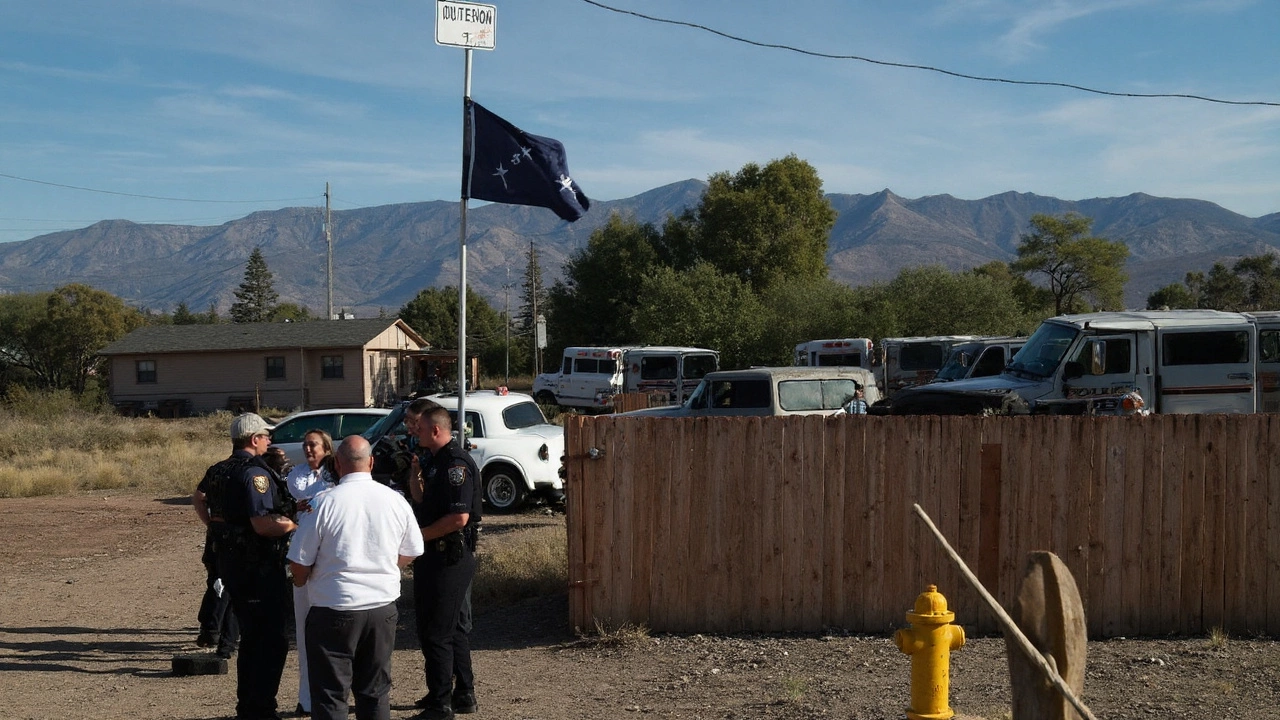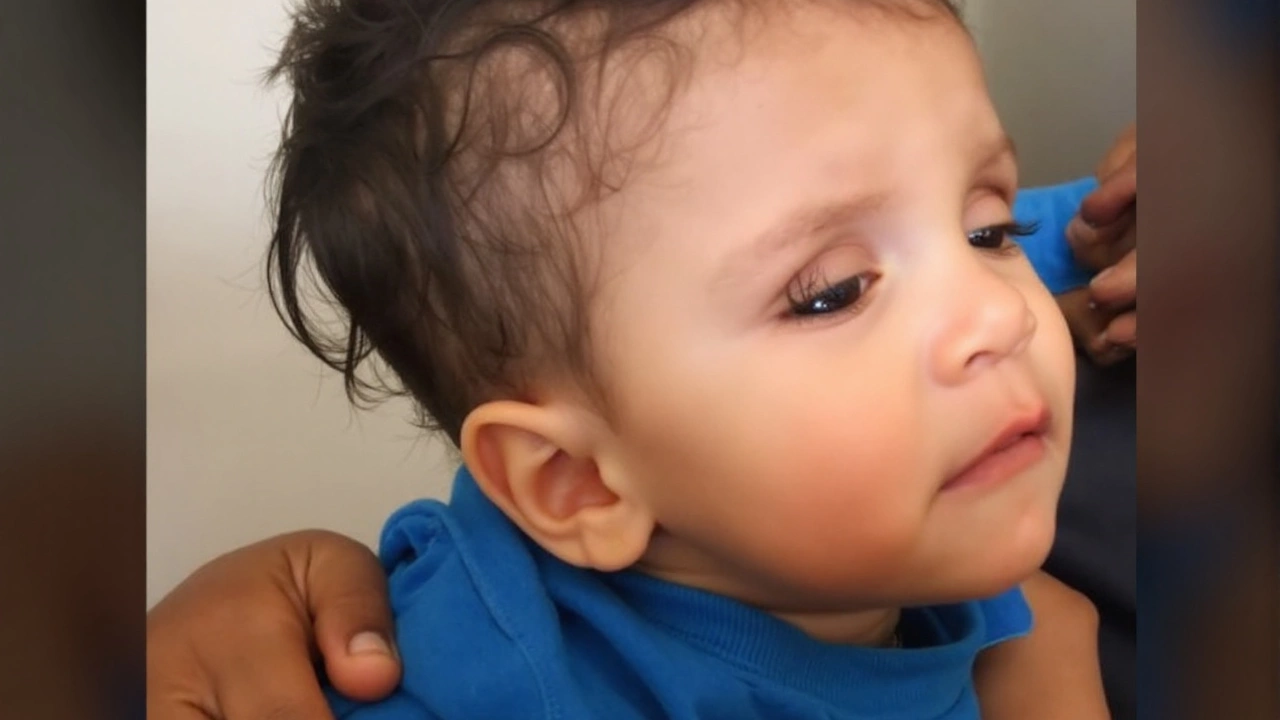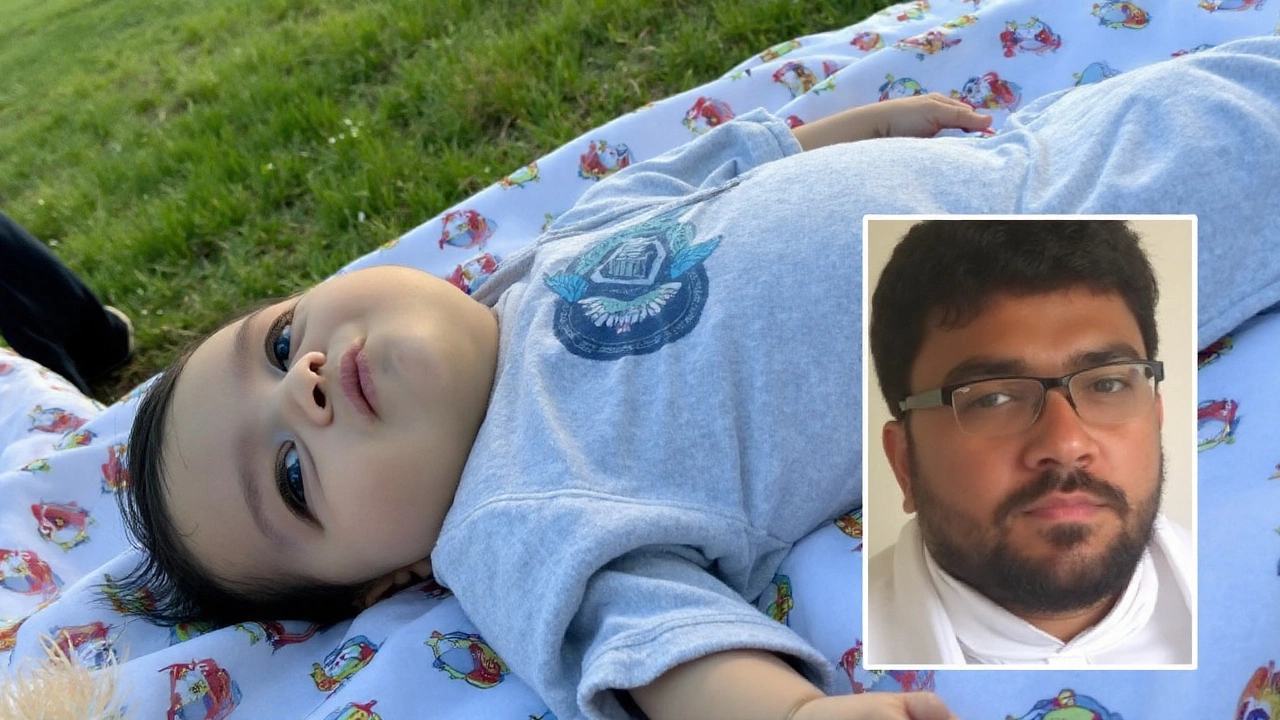What investigators say happened
Armored trucks rolled onto a quiet street in Cabazon on Friday, smashed through a front gate, and ended one story while opening a darker one. Deputies arrested Rebecca Haro, 41, and Jake Haro, 32, on suspicion of murder in the disappearance of their 7-month-old son, Emmanuel Haro. Just days earlier, the couple had told deputies a stranger attacked Rebecca outside a Big 5 store on Yucaipa Boulevard and abducted their baby from the parking lot.
San Bernardino County Sheriff’s officials say that account didn’t hold up. After reviewing evidence and interviews, investigators concluded there was no abduction and that the kidnapping had been staged. In a statement, the department said it believes Emmanuel is deceased, and the “search to recover his remains is ongoing.” The infant’s body has not been found.
The timeline starts on August 14 at 7:47 p.m., when the parents called in the report. Yucaipa, a foothill city along the 10 Freeway, saw patrol cars sweep the shopping corridor as detectives pieced together what they could from the scene and surrounding businesses. That initial urgency soon shifted. As evidence mounted, detectives redirected their work away from finding a kidnapper and toward reconstructing what happened before the 911 call.
By Friday, the case had moved to the family’s home on Ramona Street in Cabazon, about 25 miles east. The sheriff’s SWAT-style arrival signaled how seriously investigators were treating the situation. Both parents were taken into custody. The department did not detail what evidence led to the arrests but made clear that detectives no longer believed a stranger took the baby.
On Sunday, the search widened again. In a remote field in Moreno Valley, near the 60 Freeway and Gilman Springs Road, deputies walked grid lines with cadaver dogs. Cameras captured Jake, in an orange jail jumpsuit, accompanying investigators at the site. The search ended that day with no recovery, but detectives said they are not done looking.
At the family’s Cabazon block, roughly 50 people gathered for a memorial. Neighbors set out candles and stuffed animals. Some mourners flew in from out of state after following the case online. The tone was quiet and raw—more questions than answers, and a fear that the answers may never feel satisfying.

What comes next
The Haros are expected to appear in court soon, where prosecutors could seek murder charges. In California, prosecutors can file a murder case without a body if they believe they have enough evidence—statements, digital records, forensic findings, and other circumstantial proof that, taken together, show a death occurred and who is responsible. It’s a higher bar in practice, but not unheard of. The sheriff’s statement suggests investigators think they can meet it.
Detectives say the parents stopped cooperating after the initial report. That alone doesn’t prove anything, but it marks a turning point in many cases. Once cooperation stops, investigators typically lean more on search warrants for devices and vehicles, forensic testing inside the home, and any surveillance that shows where the family went and when. None of those steps have been spelled out in public filings yet, but the raid, arrests, and field searches point to a methodical build.
Public records add troubling context. Court documents show Jake has a 2018 conviction for child cruelty and was arrested last month for illegal gun possession while still on probation. During the current investigation, social services removed a 2-year-old from the home after finding the child at risk. Those facts don’t decide this case, but they will loom in any bail arguments or pretrial motions prosecutors bring.
Meanwhile, the search continues. Cadaver dogs are one tool, but investigators often circle back to familiar places: the home, known routes, secluded fields, trash transfer sites, and waterways. They also retrace a subject’s recent movements through license-plate readers, phone location data, and gas or store receipts. The Moreno Valley field suggests detectives are working off specific leads rather than simply casting a wide net.
Community reaction has been intense. Child abduction reports trigger a primal response—parents clutch strollers a little tighter, and strangers look twice at parking lots. When investigators say a kidnapping was staged, that fear turns to anger. People feel manipulated, and trust erodes. Law enforcement officials know that dynamic, which is why they tend to move cautiously and speak sparingly as they build a case.
Yucaipa and Cabazon sit in the Inland Empire, where San Bernardino County deputies handle large, spread-out search areas with limited daylight and tough terrain. That geography matters. A wide valley, freeway corridors, and patches of open desert create dozens of potential search zones. Moving gear and teams between sites eats time. Ending Sunday’s search without a recovery doesn’t close the window; it just means investigators are recalibrating.
What might the first court hearing show? Usually, very little. Arraignments are quick: charges are read, a plea is entered, and lawyers argue custody status. If prosecutors file murder charges, they will have to show probable cause at a later hearing. That’s when some evidence—though not all—becomes public. Until then, much of the case will live inside sealed affidavits and lab reports.
The human side is inescapable. A baby is missing, and the people who were supposed to protect him are accused of faking the story that set everything in motion. Neighbors are left with a shrine at the end of the block and a lot of what-ifs. Detectives have a grim job: find the child, preserve evidence, and avoid mistakes that could weaken the case later. Every day that passes makes that work harder, but not impossible.
Here’s what we know, point by point:
- August 14, 7:47 p.m.: The Haros report a kidnapping in a Yucaipa parking lot, claiming an attack and abduction outside a Big 5 store.
- Investigators later say there was no abduction and the disappearance was staged.
- Friday: Deputies arrive with armored vehicles at the family’s Cabazon home, ram the gate, and arrest Rebecca and Jake on suspicion of murder.
- Sunday: Jake, in an orange jail jumpsuit, accompanies deputies and cadaver dogs during a search of a Moreno Valley field near the 60 Freeway and Gilman Springs Road. No remains are found.
- The Sheriff’s Department says it believes Emmanuel is deceased and is focused on recovering his remains.
- Records show Jake’s 2018 child cruelty conviction and a recent arrest for illegal gun possession while on probation.
- Social services remove a 2-year-old from the home during the investigation, citing risk.
Cases like this tend to move in bursts—long stretches of quiet, then a sudden search, then silence again. That stop-and-start rhythm often tracks with lab timelines, court approvals for new warrants, or fresh tips. The department has not released a timeline for future searches, but the public cue is simple: if detectives think a location could hold evidence, they will return to it, with or without the cameras.
The memorials will keep growing as people look for a way to process what they’re seeing. Some traveled across state lines to stand on that street because they recognized the feeling—grief, confusion, and a need for truth. The sheriff’s line is steady: recover Emmanuel, build the case, and hand it to prosecutors. Until then, the hardest work is still ahead.

